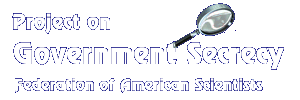 FAS |
Secrecy | 2006 News ||
Search |
Join FAS
FAS |
Secrecy | 2006 News ||
Search |
Join FAS

 |
|
|

Secrecy and Security News
Newer News: July 2006
June 2006
- Editorial: Secret U.S. program deserves scrutiny, Minneapolis Star Tribune, June 28. "President Bush's denunciation of newspapers that exposed the secret use of international wire-transfer information to track terrorists rings hollow. For years the administration has publicly included financial investigations in its arsenal of methods for tracking terrorists."
- Chilling The Press by Scott Sherman, The Nation, June 28. "In recent months that essay--'Has The New York Times Violated the Espionage Act?,' which appeared in the March issue of Commentary--has taken on a life of its own and has brought its author a certain degree of fame and notoriety."
- Reading the Classifieds by Al Kamen, Washington Post, June 28. "The State Department's Information Systems and Services office reminded everyone last week that putting SBU (Sensitive But Unclassified) on cables and e-mails is useless in terms of actually keeping the information from the public."
- Secret U.S. Program Tracks Global Bank Transfers by Josh Meyer and Greg Miller, Los Angeles Times, June 23. "The U.S. government, without the knowledge of many banks and their customers, has engaged for years in a secret effort to track terrorist financing by accessing a vast database of confidential information on transfers of money between banks worldwide."
- The Bush Code of Secrecy by Mark Follman, Salon, June 23. "American presidents have long tested the bounds of executive power during wartime. But when it comes to protecting its secrets, the Bush administration has flexed unilateral power to a degree never before seen in U.S. history."
- Citing 'lack of cooperation,' government watchdog will continue to limit role in US intelligence oversight by John Byrne, Raw Story, June 20. "The GAO�s policy on intelligence oversight is especially pertinent now as the Senate Select Committee on Intelligence continues their investigation into pre-war Iraq intelligence and statements made by Bush Administration officials prior to war."
- Intel forum breaks new ground by Wilson P. Dizard III, Government Computer News, June 26. "In a striking departure from the hush-hush culture of intelligence community IT, the CIO�s office for the Director of National Intelligence is running an open online forum about certification and accreditation issues, as well as other technology matters."
- Encryption allows for security and privacy by Brian Bergstein, Associated Press, June 18. "As new disclosures mount about government surveillance programs, computer science researchers hope to wade into the fray by enabling data mining that also protects individual privacy."
- ACLU tries to force Pentagon to turn over records on peace groups by Drew Brown, Knight Ridder Newspapers, June 14. "A civil rights group sued the Defense Department on Wednesday in an effort to force the Pentagon to turn over information it's collected on peace groups and antiwar activists under a controversial program designed to track terrorists."
- Public Secrets by Robert G. Kaiser, Washington Post, June 11. "Why does The Washington Post willingly publish 'classified' information affecting national security? Should Post journalists and others who reveal the government's secrets be subject to criminal prosecution for doing so?"
- Expansion of wiretap law is allowed by Douglas Birch, Baltimore Sun, June 10. "A federal appeals court has backed a Bush administration effort to make it easier to wiretap Internet-based phone calls, a ruling that supporters say will seal off a haven for criminals and terrorists and that critics fear could erode privacy rights."
- Public Interest Declassification Board (PIDB); Notice of Meeting, Federal Register, June 8. The PIDB will hold a public meeting on June 23.
- Cheney�s Office Declares Exemption from Secrecy Oversight by Michelle Chen, The New Standard, June 7. "Thickening the haze of secrecy surrounding the executive branch, the Office of Vice President Dick Cheney has declared itself exempt from a yearly requirement to report how it uses its power to classify secret information."
- Adm. Bill Studeman Named to the Public Interest Declassification Board, June 6. "The Chair announces the Speaker's appointment of the following member on the part of the House to the Public Interest Declassification Board for a term of 3 years: Admiral William O. Studeman, Great Falls, Virginia."
- Statement of Stanley Moskowitz, CIA at a press briefing by the Interagency Working Group on Nazi War Crimes, June 6. "Over the past year, we have released 27,000 pages from 174 files. Most of this is new material."
- Statement of Thomas H. Baer at a press briefing by the Interagency Working Group on Nazi War Crimes, June 6. "The release of new materials from the Central Intelligence Agency we are announcing today is an extraordinary development in the annals of the Agency."
- Statement of Richard Ben-Veniste at a press briefing by the Interagency Working Group on Nazi War Crimes, June 6. "Today's announcement represents a rare victory for those in our nation who advocate more openness in government."
- Invoking Secrets Privilege Becomes a More Popular Legal Tactic by U.S. by Scott Shane, New York Times, June 4. "Facing a wave of litigation challenging its eavesdropping at home and its handling of terror suspects abroad, the Bush administration is increasingly turning to a legal tactic that swiftly torpedoes most lawsuits: the state secrets privilege."
Older News: May 2006
 FAS |
Secrecy |
2006 News ||
Search |
Join FAS
FAS |
Secrecy |
2006 News ||
Search |
Join FAS
 http://www.fas.org/sgp/news/2006/06/index.html
http://www.fas.org/sgp/news/2006/06/index.html
 Maintained by Steven Aftergood
Maintained by Steven Aftergood



